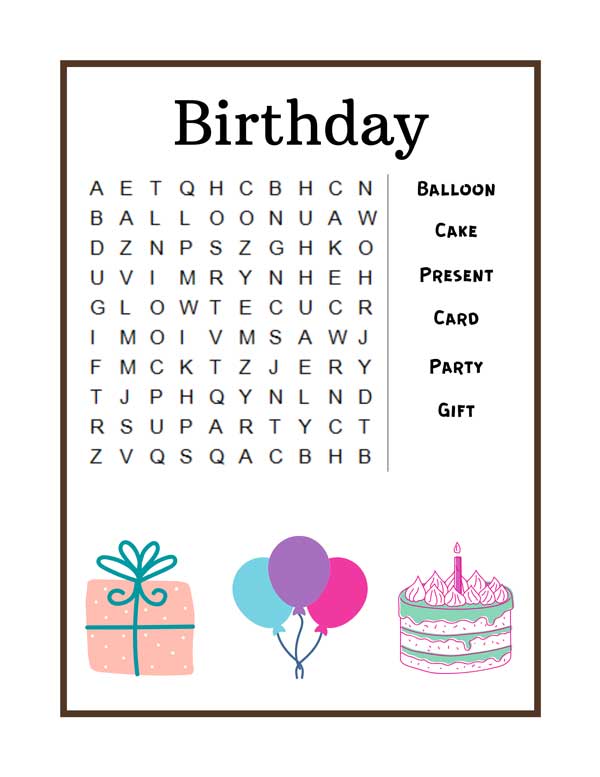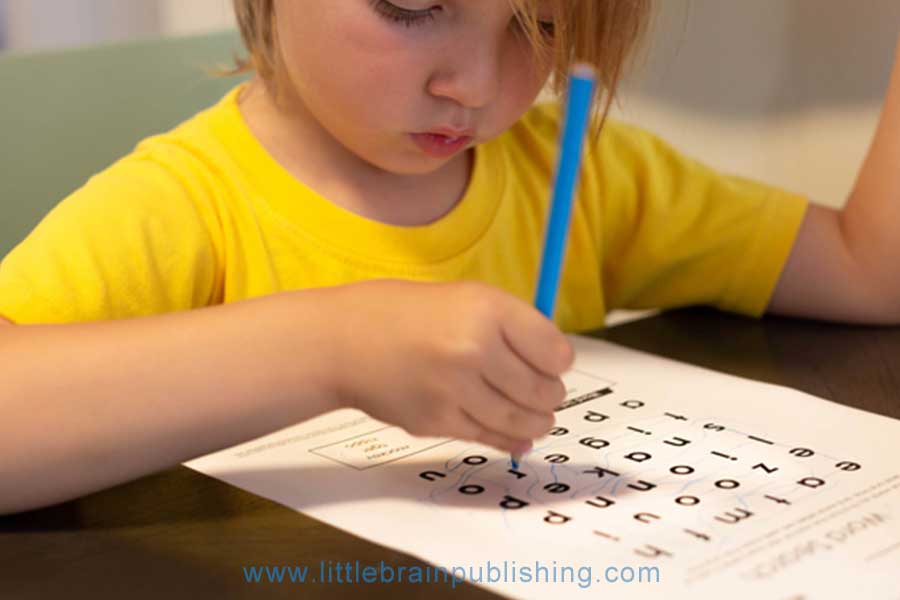The kindergarteners develop an appetite to read and learn everything they see reasonably quickly. Word Search is a great tool to reinforce new words and interest in learning. But whether kindergarteners can solve word searches or not, you must be wondering. Let’s address this in the article.
Can Kindergarteners do Word Searches? An average kindergartener can learn up to 3000 to 6000 words. So they can easily exercise their little brains with word search puzzles. But they need to experience the joy of learning and solving first. As soon as they experience it, they sharpen their skills in this vocabulary game.
What is Word Search?
Word Search is a puzzle in which words are jumbled within a grid. The possible/basic strategy is to search horizontally, vertically, or diagonally. The words can be found in normal progression or reverse order.
For example, a word found horizontally from left to right is considered “Normal” (MASK). And, the same word placed from right to left would be “Reverse” (KSAM). These puzzles are great exercises for word spotting, quick pattern recognition, and vocabulary.

Are Word Searches suitable for a Kindergartener?
Word Search develops pattern recognition smartness. They are for every age group from kindergarten onwards. Word searches are especially beneficial at the elementary level. It develops scanning skills, which are essential as your child progresses to higher education. Scanning is a vital skill because of how a child views alphabets, their addition, and sound; understanding is essential.
Teachers often use word searches to review a child’s vocabulary. It also teaches persistence and perseverance until the task is completed. A lot of children lack perseverance because they haven’t needed it yet. Today cell phone consumption is addictive to kids. They make them hyperactive and damage their concentration.
Meanwhile, in a word search, they build perseverance without getting frustrated. It develops competitiveness and work ethic.
Word Search can be a useful tool for eye training. The use of word search, puzzles, etc., is an effective way for students with reading difficulties.

Such games help them discriminate letters, which are often found the cause of reading difficulty or dyslexia. Every puzzle or activity correlates with some parts of the brain.
Word Search also prepares a child for the future. Scanning ability is tested in Data Interpretation, data analysis, etc.
For a kindergartener, if you are thinking about whether he/she can solve it. The one-word answer is “YES.”
Word Search can give you a review of your child’s current vocabulary status and scanning ability. And, if your child gets frustrated solving puzzles, there’s still some room for improvement. A child won’t take much initiative initially, but as a parent or teacher, it’s your job to indulge him/her in such activities. If you give up before you try, the results will be the same no matter how often you try.
What is the Easiest way to find words in a Word Search?
At the kindergarten level, the searches are easier. But, the concept of Word search is alien to them. So, if you are thinking, how will your kid crack those word searches? Here are the best ways to find words easily from a word search.
1. Ignore the Word List:
Start solving the puzzle by ignoring the word list. Try to find the maximum words you can. Once you are not able to find any more words, check out the word list. Markdown the words you have found, and let’s see the missing ones.

Suppose three words are missing. Now, choose anyone and search the first two alphabets of the word on the grid. Remember to search horizontally and vertically only. If possible, check in a reverse direction (right to left). You might find the word, but if not, now it’s time to review the diagonals.
2. Use a Ruler:
Using a ruler is the best and most effective way to solve word searches. When you are checking horizontally, keep a ruler scale below the line you are reviewing. It eliminates the distraction. Do the same for vertical and diagonal.
3. Spin the page and vertical:
Once you have figured out words in horizontal, you can do the same for vertical. But you can try out turning the word search and search in vertical. Try to keep the word search in a normal position for the diagonal search. Always use a scale to eliminate distractions.
4. Look For VOWELS:
All the words have one or more vowels. So to find a word, go for the vowels. If you find a vowel, it means there could be a word hiding in that vowel. So quickly scan horizontal, vertical, and diagonally to see if you can catch a word. Also, Many times the vowel may have more than a word hidden. So do you scans all around.
5. Look for a common group of the word:
If there are still a few words remaining after searching words horizontally, vertically, and diagonally, you may try this method. Look for common words. Why? Because, for Kindergarten word searches, the game is to broaden their vocabulary. So, usually, they are based on a theme like Christmas, Birthday ( shown in the 1st Picture), Sport, etc.
Suppose four words are missing, let’s say RIGHTBACK, COACH, FEWER and SUCH. And, there are words like FULLBACK, PLAYER, etc. Here, “CK” is common; you can try to find RIGHTBACK near FULLBACK. You may also try searching for words in reverse order. For example, search for ER for FEWER.
6. Use different color highlighters:
When solving word searches, use different color markers. Try to employ 3 to 4 colors for horizontal, vertical, diagonal, and last few words left. Differentiating colors makes it easy to find the unfound words.
7. Seek strange and circular alphabets:
Search for strange alphabets like B, K, Q, J, X, Y, or Z. It’s rare to see such alphabets creating words in a word search and makes it easier to find words. Meanwhile, try to find circular alphabets like O, D, and Q.
How many words should a child know by Kindergarten?
An average kindergarten child might know around 5500 to 6000 words. It might sound like a significant number. Meanwhile, low academic scoring children might know around 3000 words.
The more terms a child is familiar with, the more fluent in the reading. The level of vocabulary is directly proportional to the fluency of reading.
When a child knows the word and its meaning, he can focus on the text and enjoy the comprehension. Reading is mainly about word recognition and vocabulary during the kindergarten days.
Word Search might look simple, but when you put a range of vocabulary jumbled up within a grid, it can enhance a children’s grasping power. Kindergarten is a phase where a child usually learns poems, stories, and rhymes. The child, who reads more, repeats more has a broader vocabulary and is a fluent reader. Those who read less have fewer words and are at a disadvantageous side of reading.
Finding and repeating is the ideal ingredient in making a word search a vocabulary development activity.
Conclusion:
Word Search is a fun game for kindergarten children. Solving these searches maximizes your child’s potential for reasoning and cognitive skills. Building language skills from a young age are excellent for upcoming academic success.
For a kindergartener, approximately 4000 words vocabulary is average. Word knowledge of more than 4000 can be considered for brighter students. If you haven’t tried word search, try to make your child catch up on those puzzles because it’s a great switch from mobile games. Also, use our given strategies, which are quite a basis.
